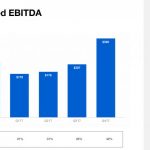The US dollar has a slight downside bias today through the European morning. The market does not seem particularly focused on high frequency data, though sterling traded higher after an unchanged year-over-year reading of 2.3%, and the euro traded higher after a stronger Germany ZEW survey.
Geopolitical concerns continued to be elevated. The South Korean won’s slide has been extended for the sixth consecutive session and ten of the past 11 sessions. Its 0.3% decline today brings this week’s loss to 1.0% after around a 1.4% loss last week. Korea’s Kospi’s nearly 0.5% loss today is also its sixth consecutive loss and also was among the larger losers in today’s session that saw the MSCI Asia Pacific Index slipped 0.1%.

European shares are also trading with a slight downside bias. Information technology and financials are leading the way lower, while consumer discretionary and real estate are doing better. With the tightening in the French polls ahead of the election in a couple of weeks, pressure is staying on France, where bonds are under pressure and the 10-year premium over Germany continues to trend back to the high seen in February.
Since the end of March, the French premium on 10-year yields has risen a little more than 10 bp to 75 bp. The late February high was 79 bp. The 2-year premium investors are demanding to hold French paper is making new multi-year highs today near 56 bp. It has more than doubled since the late-March. The February high was 45 bp. It has been nearly five years since the 2-year premium was this large.
The German investor survey, ZEW, rose more than expected. The assessment of the current situation rose to 80.1 from 77.3. This is a new six-year high. The expectations component rose to 19.5 from 12.8. This is the highest since August 2015. With the DAX up four consecutive months through March, a euro that makes German businesses extremely competitive and low yields, it is hardly surprising that investor confidence is buoyant in Germany. That said sentiment is running ahead of real sector data. Earlier today, the German 10-year yield slipped briefly below 20 bp for the first time since late February. It is trading a little above there near midday in Europe.












Leave A Comment